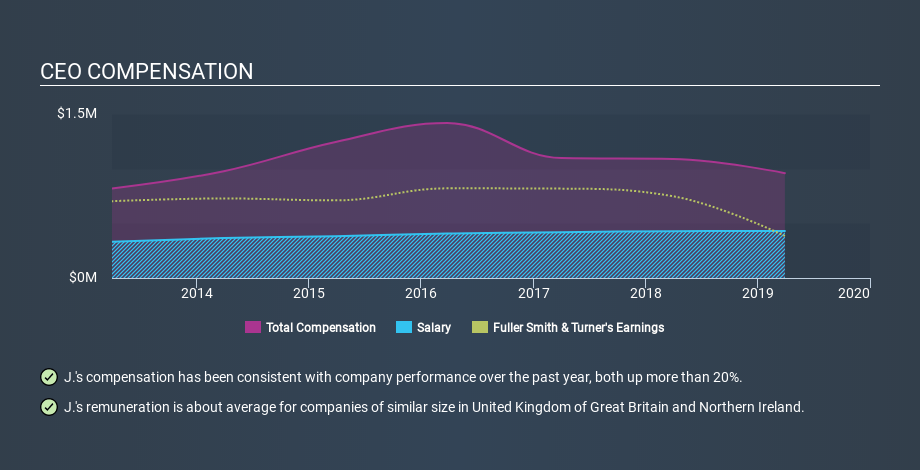How Should Investors React To Fuller, Smith & Turner P.L.C.'s (LON:FSTA) CEO Pay?

J. Emeny became the CEO of Fuller, Smith & Turner P.L.C. (LON:FSTA) in 2013. First, this article will compare CEO compensation with compensation at similar sized companies. Next, we'll consider growth that the business demonstrates. And finally we will reflect on how common stockholders have fared in the last few years, as a secondary measure of performance. This method should give us information to assess how appropriately the company pays the CEO.
View our latest analysis for Fuller Smith & Turner
How Does J. Emeny's Compensation Compare With Similar Sized Companies?
According to our data, Fuller, Smith & Turner P.L.C. has a market capitalization of UK£526m, and paid its CEO total annual compensation worth UK£959k over the year to March 2019. While we always look at total compensation first, we note that the salary component is less, at UK£430k. As part of our analysis we looked at companies in the same jurisdiction, with market capitalizations of UK£307m to UK£1.2b. The median total CEO compensation was UK£888k.
So J. Emeny is paid around the average of the companies we looked at. This doesn't tell us a whole lot on its own, but looking at the performance of the actual business will give us useful context.
You can see a visual representation of the CEO compensation at Fuller Smith & Turner, below.
Is Fuller, Smith & Turner P.L.C. Growing?
Fuller, Smith & Turner P.L.C. has reduced its earnings per share by an average of 30% a year, over the last three years (measured with a line of best fit). Its revenue is up 30% over last year.
The reduction in earnings per share, over three years, is arguably concerning. But in contrast the revenue growth is strong, suggesting future potential for earnings growth. These two metric are moving in different directions, so while it's hard to be confident judging performance, we think the stock is worth watching. Shareholders might be interested in this free visualization of analyst forecasts.
Has Fuller, Smith & Turner P.L.C. Been A Good Investment?
With a total shareholder return of 15% over three years, Fuller, Smith & Turner P.L.C. shareholders would, in general, be reasonably content. But they would probably prefer not to see CEO compensation far in excess of the median.
In Summary...
Remuneration for J. Emeny is close enough to the median pay for a CEO of a similar sized company .
The company isn't showing particularly great growth, and shareholder turns haven't been particularly inspiring in the last few years. While the CEO may not be underpaid, we don't think the pay is too generous either. If you think CEO compensation levels are interesting you will probably really like this free visualization of insider trading at Fuller Smith & Turner.
Important note: Fuller Smith & Turner may not be the best stock to buy. You might find something better in this list of interesting companies with high ROE and low debt.
If you spot an error that warrants correction, please contact the editor at editorial-team@simplywallst.com. This article by Simply Wall St is general in nature. It does not constitute a recommendation to buy or sell any stock, and does not take account of your objectives, or your financial situation. Simply Wall St has no position in the stocks mentioned.
We aim to bring you long-term focused research analysis driven by fundamental data. Note that our analysis may not factor in the latest price-sensitive company announcements or qualitative material. Thank you for reading.

 Yahoo Finance
Yahoo Finance 
